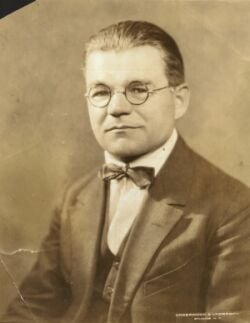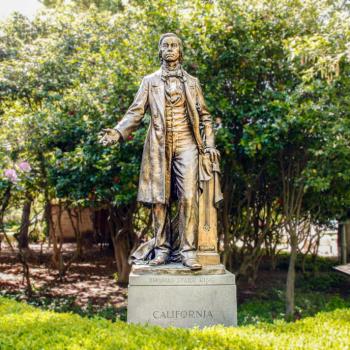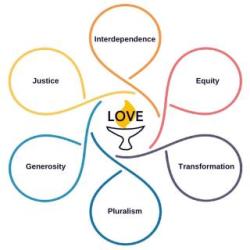DREAMING OUR FATHERS
Norbert Capek and the Unitarian Universalist Flower Communion
James Ishmael Ford
18 June 2017
Unitarian Universalist Church
Long Beach, California
A Story
Norbert Capek was born in Bohemia, in what is today the Czech Republic in 1870. He was raised Catholic. But following a religious exploration he became a Baptist minister. Norbert was a social activist and realizing the governmental authorities had begun to investigate him, he and his wife and their children fleeing persecution, immigrated to the US. They landed in New Jersey.
His wife died soon after they arrived. Later he met and married another Czech immigrant, Maja. She was a librarian. They courted and married. In the meantime Norbert was tried twice for heresy in the Baptist church.
They sent the kids off to explore the Sunday school programs at nearby churches. The Unitarian church was their unanimous preference. They threw themselves into their Unitarian lives..
At some point Norbert and Maja decided they needed to bring Unitarianism to the Czech people. And in 1921 they did. They founded a church in Prague. In 1926 Maja was ordained as well. Their church was a very spare Unitarianism, and while their own spirituality was a bit more complicated, the presentation was of the purer rationalist humanism of that day. The service had no music and centered pretty much only on the sermon that Norbert gave.
They really wanted to hold up the value of the rational, applying clear thinking to all aspects of life. But, also as Norbert ministered among the congregation, he saw there was something lacking. There is in addition to that thing we symbolize as “mind” there is something we call “heart.” Reaching for a more complete religious community, Norbert created a simple spring ceremony.
People brought flowers to the church. They were gathered together. They were blessed. And then people were given the flowers, now a different one for each person, who took them home. There was something in this ceremony that fed the hearts of people. Those who participated found it seemed equally important to the sermon that was feeding their minds. Something rich had happened.
Richard Henry writes, “Norbert Čapek celebrated the ‘hidden cry for harmony with the Infinite’ in every soul. ‘Every person,’ he wrote, ‘is an embodiment of God and in every one of us God struggles for higher expression.’ ‘Religion,’ he said, ‘can never die because human beings. . . cannot but be religious regardless of the form of [their] religion.’ Religion should, before all else, provide that ‘inner harmony which is the precondition of strong character, good health, joyful moods and victorious, creative life.’ ‘It is my ideal,’ he wrote, ‘that unitarian religion in our country should mean a higher culture. . . new attitudes toward life and practically a new race. . . . In short, unitarian religion should mean the next advanced cultural level of a certain people.’ The church’s task, he felt, ‘must be to place truth above any tradition, spirit above any scripture, freedom above authority, and progress above all reaction.’”
Norbert was thinking about this and what next. When the 2nd World War overtook them. Maja and most of the children returned to the United States. Maja became the minister of the Unitarian church in New Bedford. She also wrote constantly, telling Norbert to come back to America. But, he kept on with the congregation, serving them, preaching of human dignity and reason and human rights while also cultivating expressions of beauty and grace.
I don’t know, but I believe he planned on coming to America. But, he just needed to do a little more for the people he was serving. Just a little more. Then in 1941 the Nazi’s arrested him and his eldest daughter. The official charge was “listening to foreign radio broadcasts.” The real crime was preaching against authoritarianism, and in favor of all people.
He was sent to Dachau, was tortured, and in 1942, executed. The official cause of death was “heart failure.” In fact he died in the gas chambers. Richard Henry tells us, “His faith enabled him to endure his own martyrdom with an equanimity and heroism confirmed by survivors of the concentration camp in Dachau who knew him there.”
In the meantime Maja began celebrating the flower communion in New Bedford. And the celebration spread. Today almost all UU congregations celebrate it in the spring, frequently as the final service of the “formal” church year.
The truth be told these earlier days of my retirement from parish ministry, when I’m invited into a pulpit I draw heavily on earlier sermons. Usually not whole sermons, you understand. But I do like drawing on anecdotes or other illustrations, and even broad directions as guides for the new sermon. And with twenty-five years under my belt, well, I’m rarely at a loss for such resources.
And, then, we come to Fathers’ Day. As I sat down to begin my preparations, I knew nothing immediately came to mind. Which is a little unusual. I mean, I always have something to say. But, no problem, there’s my blog. What this means is I have an easily searched archive of every one of the sermons that I’ve delivered from a written out text, which means, pretty close to every sermon I’ve preached over the past ten years.
And. Out of a full decade of archived materials, I could not find a single sermon or blog reflection that referenced “father’s day.” That surprised me. So, I tried searching with the apostrophe in both possible spots, as well as without one. Zilch. Not a single sermon, not a single blog posting on that subject. Actually, as I dug into it, I saw in this past decade, I’ve posted 3,849 times. And there was not a single reflection on father’s day, sermon or otherwise.
So, I wondered what would happen if I just searched for “father” all by itself. Well, it turns out 293 of my posts had that word in them. So I reviewed them. As it turned out I didn’t see a single posting that reflected on fathers in general. And, only one that specifically noted my own father. It was written a few years back noting his Sepetmber birthday. It was brief. Of James William Ford, I wrote:
“His was a rough life. Orphaned, passed around, institutionalized, run away, lived on the streets, petty crime, maybe greater crimes, prison, released into the Army toward the end of the 2nd world war, medic, badly, badly damaged, alcoholic, in and out of jail, dreamer, wisher, wanter of better and bigger things. Wanted to be an Irish Frank Sinatra. Wanted to be classy. Betrayed his family over and over again. And, he relentlessly told me how good I was, and how he loved me.”
Fathers and father’s day. No doubt a complicated subject. Not, of course, unlike that twinned holiday, mother’s day, and our relationships with our mothers. But, for various reasons father’s day has hung more in the shadows. It was conceived largely as a complement to mother’s day, and given most of its impulse by the greeting card cartel. So, in addition to the one hundred and thirty odd million cards that they are able to sell for mother’s day, the very next month they sell another ninety-four million cards in celebration of father’s day.
And, there’s more. For me and for many here, I suspect, the complexities of culture and everything that can be dropped into the term “patriarchy” poisons the water into which our celebration of fathers would be mixed. I’ve spent pretty much my entire ministerial career looking into my own heart, looking at the larger culture, and out of that acting from a desire to genuinely represent the truth that “women hold up half the sky.” And as we’ve been so immersed in a world where even our language is weighted with masculine terms as baseline, as normative, my work has been focused mostly on holding up women as whole and as strong and as leaders. And with that, as this is a spiritual project, casting light on all the many aspects of the feminine as divine.
And, let’s be frank. That work is not done. Nowhere near done. Although even at this moment we can see how we have all been enriched in this process. And we keep learning. All of us. Me, I’m really glad how this work has continued and has gone on to expose the deep problems with any binary reductionism of our sexuality. We not only all exist on a continuum rather than what our immediate physical attributes suggest, but how our basic identifies can and usually do fit in more than two places. We not only slide along that continuum, we encompass the whole glorious mess.
And. That fully acknowledged, I feel a need to pause and reflect just a little on fathers, on that particular spot on the continuum. What about fathers after the man as the head of household, after God the father? What about fathers as something more than a biological necessity to get the family thing going? (Well, with scientific advances, at least for the time being.)
So. My father. Your father. Our fathers. Those of us who are fathers. And that part of all of us which might be named father or fathering. What about it? And, as this is a spiritual reflection, and we have such limited time, what I really want to dig into, just a little, is what can we find in the idea of the father, in that specific part of our human identity that is worthy of our deeper reflection.
Both Freud and Jung had a field day with the idea of the father. We even have a term, “father complex” for it. And complex it is. With Freud there is a contention between a father and a son. Jung mixes it up a bit more and broadens the possibilities, for men and women, and for both good and ill. While I think Freud gets a bit of a bad rap that he only partially deserves, I find I’m nonetheless more attracted to the work of Carl Jung.
However, to be clear, I’m not a Jungian. I do not in fact believe in the collective unconscious, nor any kind of Platonic or quasi or semi or even pseudo archetypal realm. However, that said, if we hold archetypes lightly, as identifiable patterns of relationships both within our individual hearts and within our communal lives, I believe there is something to see. And, this can reveal what we might want to correct and what we might want to hold up. So, there are things to explore.
From Freud and Jung people have spent a lot of time digging into the absence part of fathers and fathering. Certainly absent was signal feature of my own upbringing. And with that there’s another term “father hunger.” It has been examined from the perspectives of both women and men. For all of us that father hunger speaks to another aspect of absence: longing. There seems a great longing for that aspect of parenting we call fathering.
And here I find something deeply compelling. James Hillman is particularly important to me. Hillman, who, as long as we’re talking about complex relationships with one’s father, is an interesting example of someone who has taken his spiritual father, Carl Jung, and starting as his heir at the Jung Institute in Zurich, proceeded to dismantle much of his mentor’s work. That is until they invited him to leave.
Hillman spent some time thinking about fathers, and absence. He reflected on this idea of the missing father, physically for some, metaphorically for others, that captures so many of our imaginations. Hillman observed how this missing father, “is not (simply) your or my personal father. He is the absent father of our culture, the (to use a Jungian term) the viable senex who provides not only daily bread but spirit through meaning and order.” The “senex” in archetypal language is the “wise old man,” our image, usually although not exclusively, our positive image of what a man can grow into. The sad thing is that this figure is increasingly experienced as something missing.
That observation makes me think a lot of things. One is that longing itself. I know everyone in this room doesn’t feel this way, but I believe I am not alone in that sense of longing for the father. Maybe, probably, not the actual father of the flesh, my father in the flesh, besides being dead, is a complicated, and not entirely lovable figure. But, rather, with Hillman, I am interested in the father writ large. And our collective desires, our communal lives, and what we need. And what we seek, either consciously or unconsciously.
I think there is legitimately a longing for that senex figure, that wise man, and the traits that are traditionally associated with him. Specifically this father not only supports us physically, providing food and clothing and shelter, he embodies kindness. He offers sound judgments on events that are confronting us. He brings a unique wisdom to the matter at hand, whatever it might be. I like that this senex father image also carries with it hints of otherness.
So, the invitation is to look within and among us for those traits that our hearts long for. And what are they? That physical support symbolized by paying the rent and putting food on the table. That emotional support, which we find as perspective, and, to use a term not so common these days, grit. Of course we also want to avoid the bad father things. And, oh, my, there are such a lot of them. Cruelty. Heavy judgment. Abandonment. In some myths the father actually devours us. In others he is a fool.
So, cutting through these things that are not helpful, and going for the heart, going for that other style of parenting, another angle on nurturing. And with that a question: how do we own fathering as a part of our spiritual journey? In short, as we genuinely ask when we hold up women, when we hold up LGBTQ people, when we hold up people of color, when we hold up immigrants, when we hold up anyone who might be considered other: how do we become whole people? And the answer is by seeing, and by wise discernment of what is useful and what is not, and then integrating. Don’t worry we each of us have a whole lifetime for the project.
With that let me return to that story we shared earlier. Over the years I’ve thought a lot about Norbert Capek and his flower communion. First, I like the man who followed his own lights, moving from Catholicism, to the Baptist tradition, and then, finally, to a rationalist humanistic version of Unitarianism. But, then, when he saw that the lecture he was offering on a Sunday was not enough to feed the genuine hunger of the people he served, he turned to the beauty of nature, and a symbol of our individuality, and our commonality. And with that `he created the simplest of rituals. People bring flowers. They are mixed. They are blessed. And they are distributed.
And, that act and that man cannot be separated from the person the Gestapo arrested and who died in Dachau. Me, I find hints of the Christian story here. But, he didn’t die for our sins. He died staying on too long to be with the people he loved. An act freighted by the fact he functionally abandoned his family to do this.
What’s a father’s love? So complex, so complicated. Me, I think Norbert’s life and, well, his death, all taken together, may well contain a hint at the whole of it, and with that at the whole of our lives.
Open ended. Messy. Filled with mistakes and wrong turns. And something so beautiful, so beautiful.
And with that amen.













